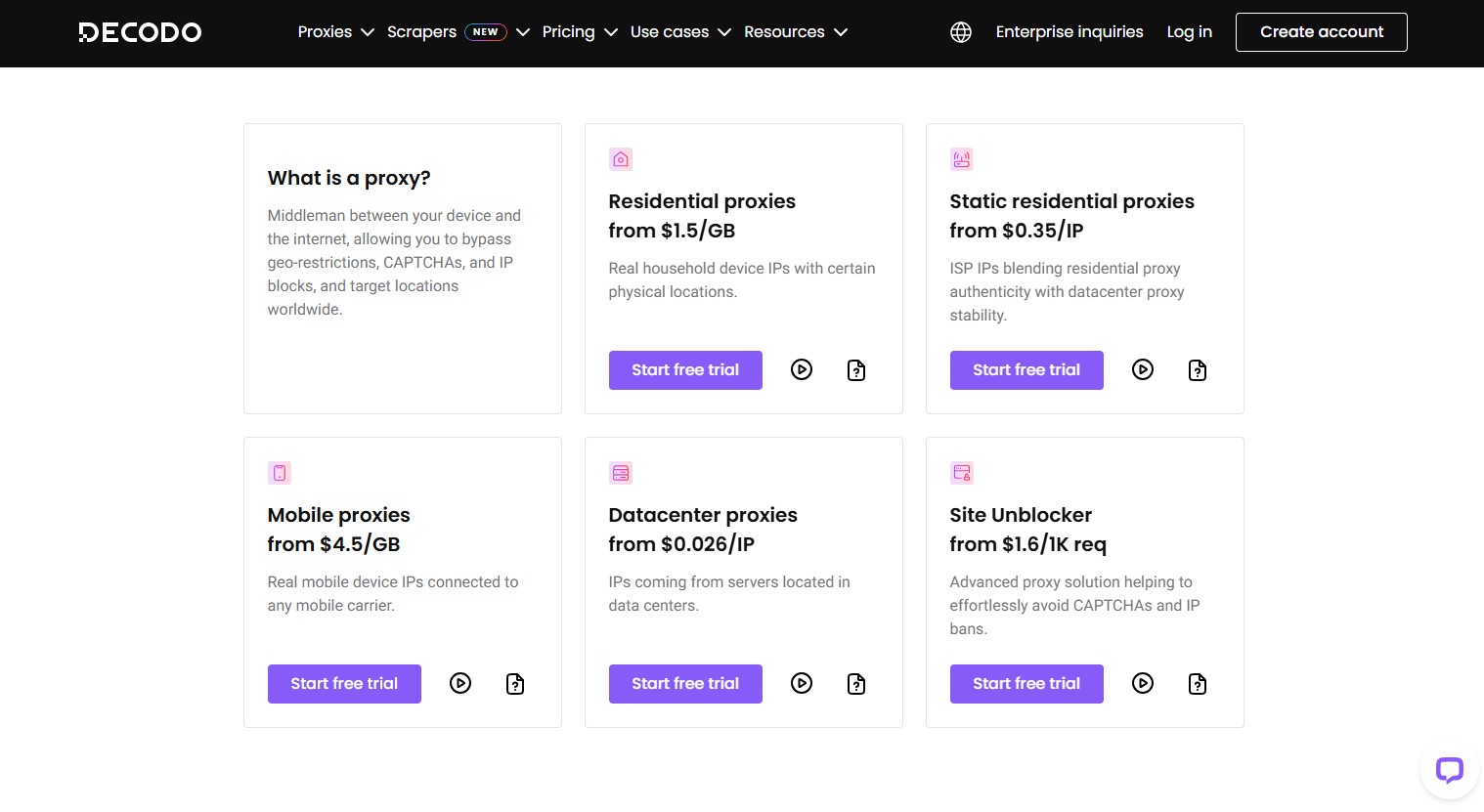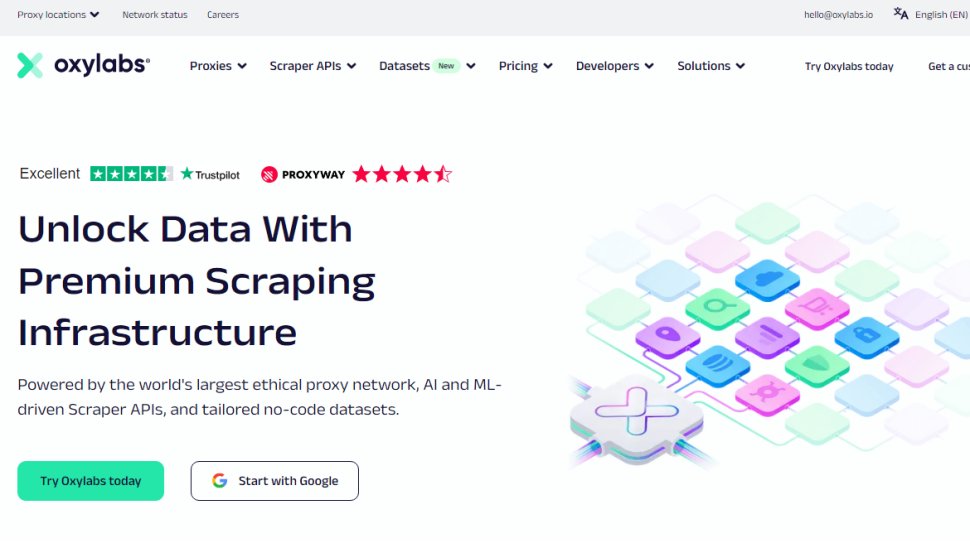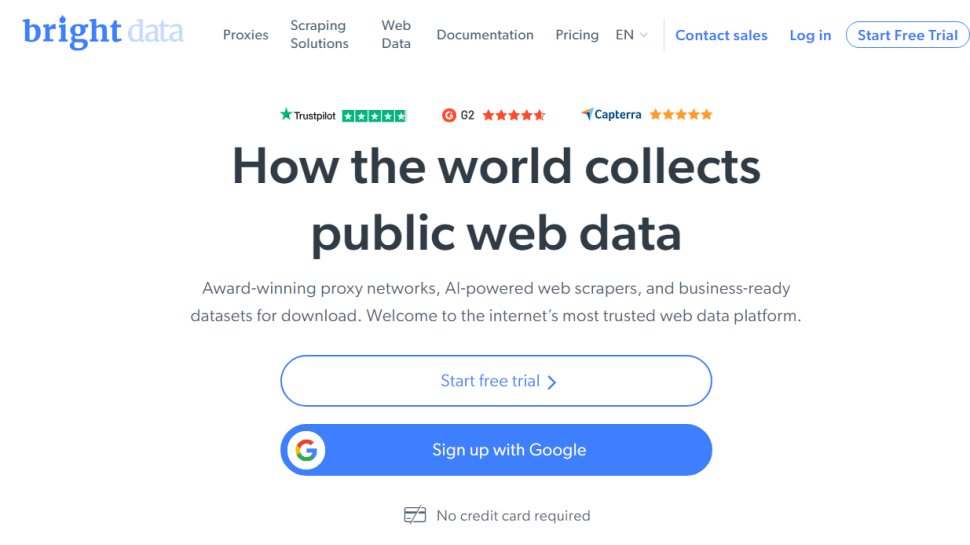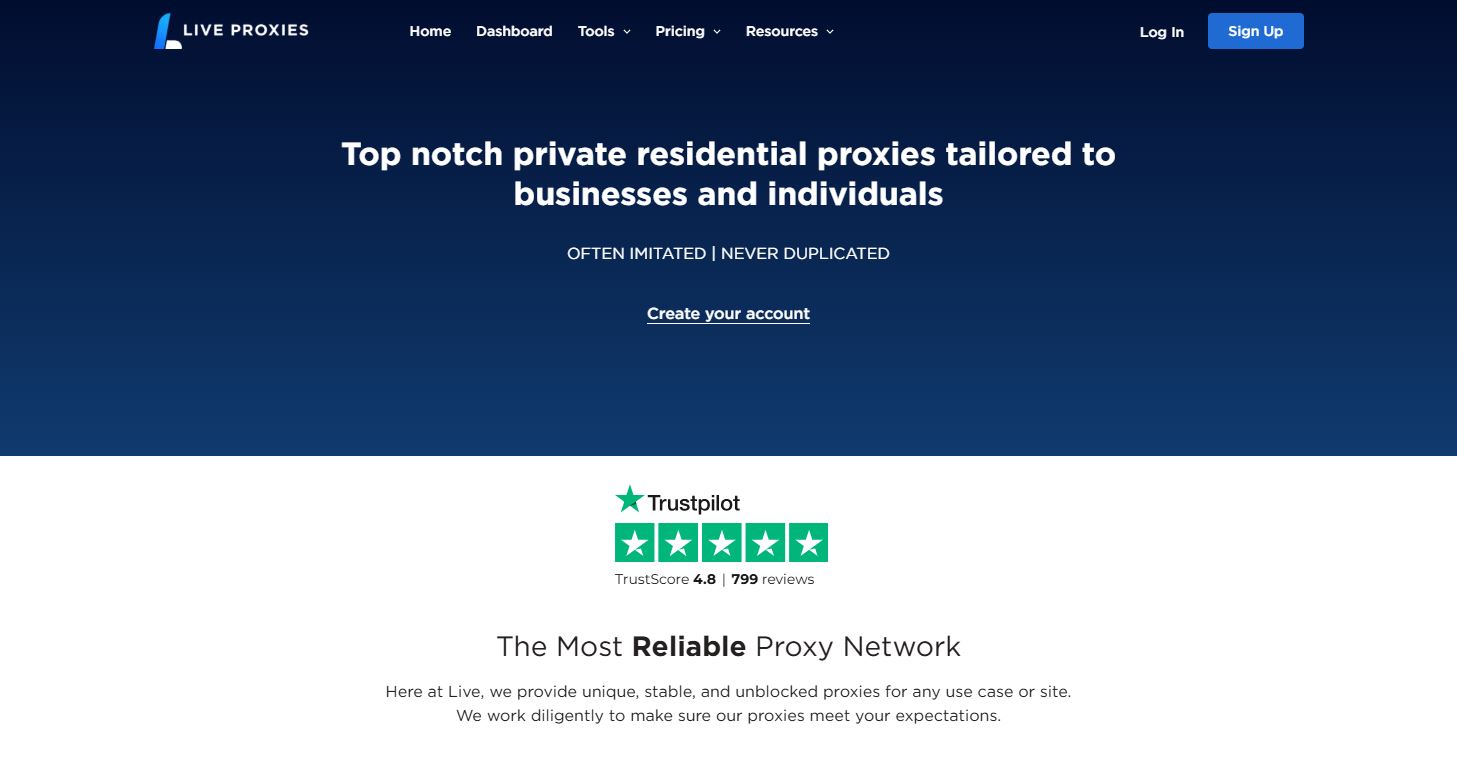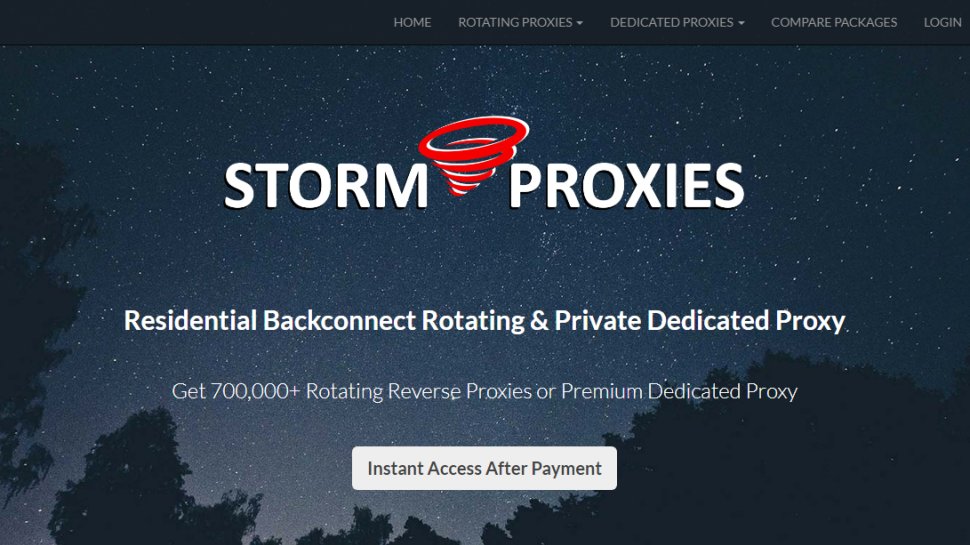Best proxy sites of 2025: tested, reviewed & ranked
The best proxy sites, services and providers to cater for all your needs
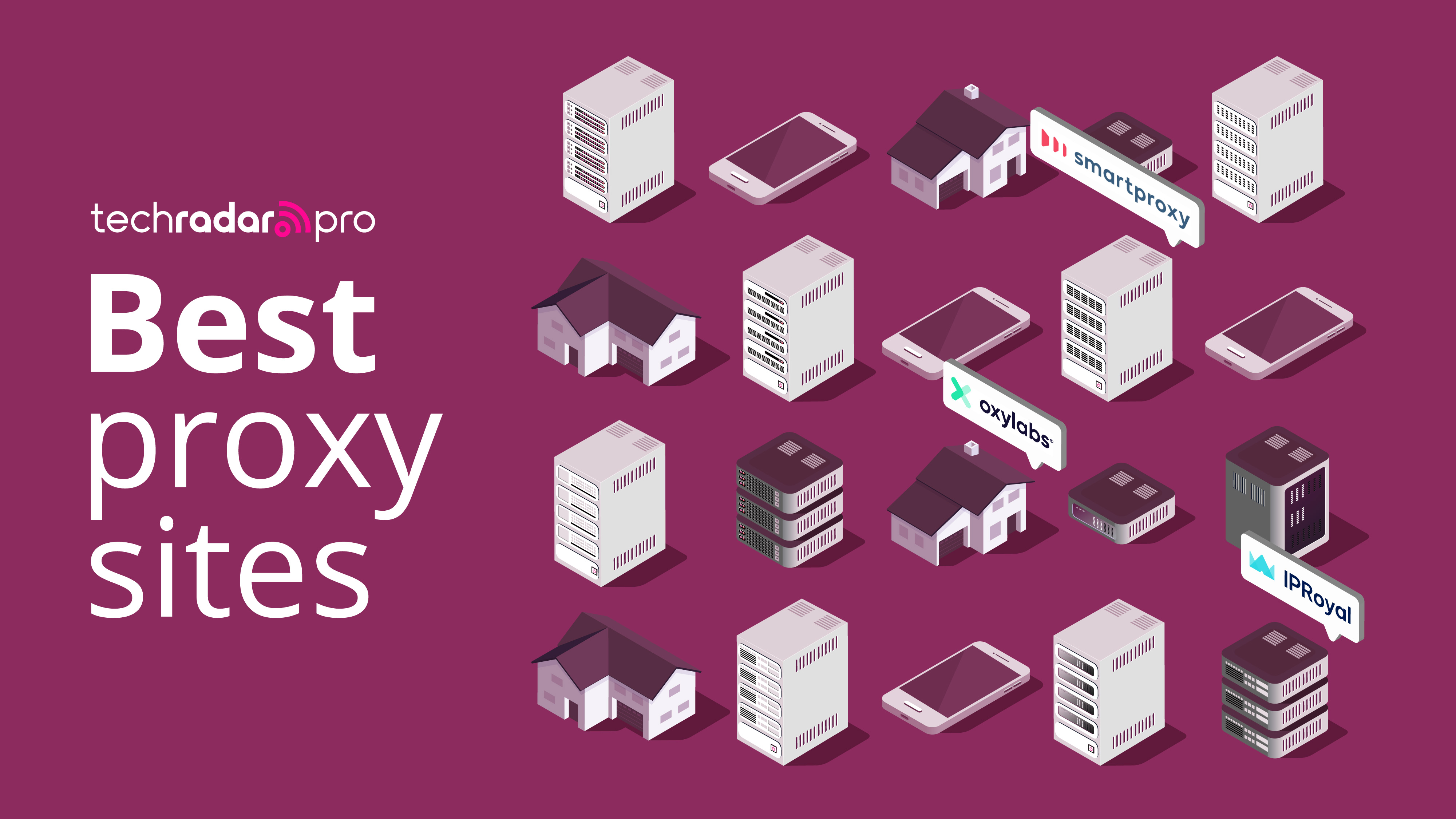
The best proxy sites can mask your IP, help you collect important data from the internet, and access geo-restricted content.
Acting as a gateway between you and your destination, the best proxy sites will allow you to choose a country your internet traffic is routed through, which helps prevent websites from seeing your legitimate IP address, and location.
Businesses utilize proxy services for a variety of reasons, but primarily for data collection, and access control. These services help businesses access and scrape data from websites, and bypass geographical restrictions or IP blocks.
Proxy services are also popularly used to simulate traffic from various locations worldwide in order to gather data for market research, and competitor analysis. For instance, many companies use proxy services to track real-time pricing data and product information from various e-commerce platforms, which in turn helps them optimize their pricing strategies.
Our experts have been testing the best proxy sites for several years now, looking at each service’s global coverage, the number of IP addresses available to use, as well as the type of proxies available which can include static and rotating residential proxies, datacenter proxies, and mobile proxies. We also consider the ease of use, availability of related data scraping products like web scraping APIs, CAPTCHA bypass options, and cost.
If you know what kind of proxy service you need, we have dedicated guides to the best residential proxies, the best datacenter proxies, the cheapest proxies, and the best free proxies.
Limited offer - 50% discount on all residential proxy plans at Decodo (formerly Smartproxy)
Use code RESI50 at checkout and save 50% on all residential proxies subscriptions. Get started from only $3.50/month and experience top-tier performance with 115M+ ethically sourced IPs from 195+ worldwide locations.
We've also tested the best free VPN.
July 2025: We have updated this guide to reflect the current pricing, speeds, performance, and technical specifications of each of the proxy sites listed on this guide, as well as including some helpful links to extra info in the FAQs.
The best proxy sites of 2025 in full:
Why you can trust TechRadar
Best proxy site overall
Specifications
Reasons to buy
Reasons to avoid
Decodo (formerly Smartproxy) operates with over 125 million global IP addresses on a global scale across residential, mobile, and datacenter solutions.
Decodo can provide you with access to over 115 million ethically sourced residential proxies across the globe, as well as over 10 million mobile proxies from over 700+ carriers across 160 countries. It also offers rotating IP addresses, which provide a means to switch IPs periodically or with each request.
When it comes to datacenter proxies however, it gets a little complicated. You can access a range of shared servers, but single-user dedicated datacenter proxies, which offer faster speeds, and are ideal for tasks requiring consistent and uninterrupted internet access, are only available in the US.
What distinguishes Decodo from competitors is its advanced scraping infrastructure. It offers specialized APIs for SERP scraping (Google, Bing, Amazon), social media data collection, and eCommerce price monitoring. Then there’s its Site Unblocker service that claims a 100% success rate at bypassing anti-bot measures including CAPTCHA. The platform includes free tools for its users, including Chrome and Firefox extensions, as well as the X Browser, which is built with a strong focus on privacy and security.
However, Decodo’s pricing model is rather complicated, which makes it challenging to determine the best plan. Plans vary between GB-based, request-based, and IP-based pricing depending on the service.
For instance, while you can get rotating residential IPs at just $1.5/GB per month, this price is only available on the 1000GB Enterprise plan, which comes to $1500. The price-per-GB increases the less data you'll use. So a 2GB plan costs $3/GB per month. The same is true for its IP-based static residential proxies, and datacenter proxies, and request-based Site Unblocker tool.
If you prefer not to commit to a monthly subscription, you can use its Pay As You Go payment system. But remember that this isn’t meant for traffic-sensitive projects. With Pay As You Go, residential proxies cost $3.5/GB 1GB, and you can purchase only one GB at a time.
Overall, Decodo is a great service for those looking for a bulk-buy option, or those who know they will be processing a large amount of data, but may not be as suitable for smaller users.
Residential | Static Residential | Mobile | Datacenter | Site Unblocker |
|---|---|---|---|---|
$1.5 per GB | $0.32 per IP | $4.5 per GB | $0.026 per IP | $1.6 per 1K requests |
Read our full Decodo review.
Best proxy site for business
Specifications
Reasons to buy
Reasons to avoid
Oxylabs is a business-centric proxy service that offers over 175 million IPs around the globe across residential, datacenter, ISP, and mobile proxies. Oxylabs primarily targets business clients with its enterprise-specific tools like Web Scraper APIs and Web Unblocker for advanced data collection.
The service also claims that its high-bandwidth proxies can easily be used to scrape video and audio data for AI models. Or, you can skip scraping, and use its newly launched product that gives you access to four million original YouTube videos ethically sourced from a million unique channels that you can use to train AI models.
Another new launch is the anti-bot remote headless Unblocking browser. It mimics human behavior to bypass anti-bot systems and solve CAPTCHAs. Oxylabs also offers a host of open source tools and scripts to help you improve your inhouse scraping tools, and extract data from various Google services.
Now, the pricing certainly reflects Oxylabs' business demographic. The provider offers a pay-as-you-go plan for residential proxies at $4 per GB, but also has set plans, ranging from Premium at $400 for 133GB of traffic per month, up to Corporate at $2000 for 1TB per month. ISP proxies start at $1.6/per IP, mobile proxies start at $9 monthly per GB, and datacenter proxies start at $12 monthly for 10 IPs.
Before you reach for your wallet, you can take the Web Scraper API on a week-long free trial. To get a free trial for its other proxy solutions, you’ll have to contact their sales team.
To justify the pricing to businesses, Oxylabs provides ISP proxies leased directly from companies such as AT&T, Comcast, Lumen, Orange, and Frontier with plans offering unlimited duration sessions and dynamic IP rotation to ensure consistent uninterrupted operation perfect for mass data scraping, market research, and ad verification.
Datacenter proxies are sourced from a global network of datacenters spread across various countries including locations in the United States, United Kingdom, Germany, France, Canada, and more. Oxylabs also offers city and state targeting within these locations, allowing users to pinpoint their proxy location with precision. You can get these in both a semi-dedicated and shared IP format with connections through HTTP, HTTPS, and SOCKS5 protocols.
Read our full Oxylabs review.
Residential | Shared Datacenter | Shared ISP | Mobile |
|---|---|---|---|
$4 per GB | $1.2 per IP | $1.6 per IP | $9 per GB |
Best affordable proxy site
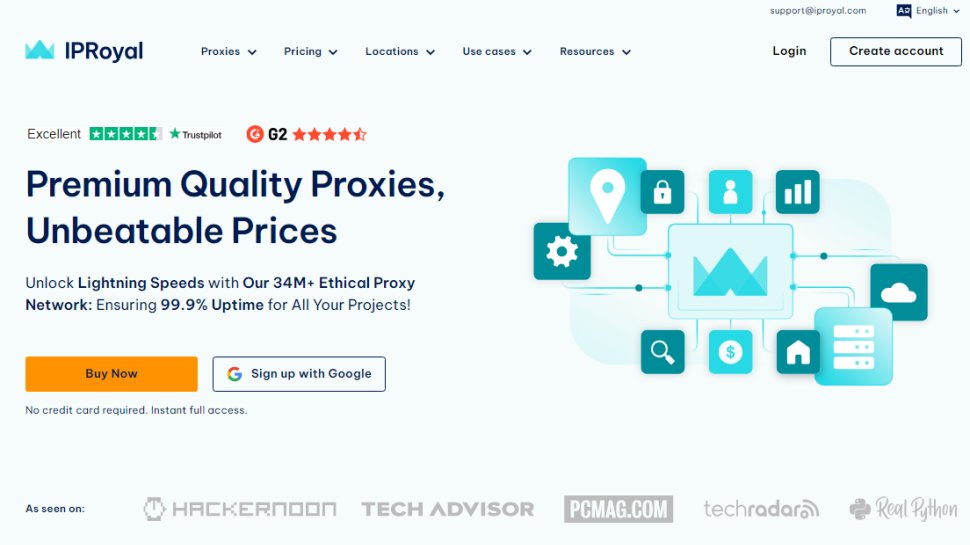
Specifications
Reasons to buy
Reasons to avoid
IPRoyal offers a range of proxy services at a reasonable price point. Since our last review, IPRoyal has upped its provision of residential proxies from 1 million to 34 million, with all of these being "100% ethically sourced," according to the proxy provider. IPRoyal also boasts over 4.5 million mobile IPs, with datacenter proxies available in just over 40 countries.
The service has one of the most intuitive user interfaces and is very beginner friendly, especially when considering the 24/7 access to customer support services. The platform offers flexible targeting options, allowing users to filter by region, country, and city. This is compounded by the IPRoyal browser extension for both Google Chrome and Firefox, which allows you to manage your proxy connections while browsing the web to help minimize interruptions.
Pricing stands out as IPRoyal’s key selling point. The company frequently runs promotional offers, and is currently advertising a 50% discount. Its most popular 10GB residential proxy costs $2.63/GB with a subscription, and only slightly more at $2.76/GB with the pay-as-you-go payment scheme, which is ideal for those with fluctuating workloads.
Its datacenter proxies support SOCKS5 and cost $1.57/proxy when subscribed for 30 days, or $1.39/proxy when subscribed for 90 days. Similarly, its mobile proxies range from $10.11/day with the 24 hours package, to $117/month for the 90 days package. The non-expiring traffic for rotating proxies, unlimited bandwidth and threads for datacenter, and mobile proxies, are big pluses.
On the downside however, IPRoyal’s proxy pool isn’t as big as that of some of its more established peers like Decodo, and Oxylabs. What's more, there is no customer support by phone, and no free trial for those looking to test the service before committing.
In our opinion, IPRoyal will suit budget-conscious users, and those looking to test and scale flexibly, without making any long-term commitments.
Residential | Datacenter | Mobile | ISP |
|---|---|---|---|
$2.45 per GB | $1.39 per IP | $117 per month | $1.80 per proxy |
Read our full IPRoyal review.
Best proxy site for deep pockets
Specifications
Reasons to buy
Reasons to avoid
Bright Data, which may be known to some under its previous name, Luminati, offers over 150 million IPs across the globe, with a particularly notable customer support service and flexible costs for its range of proxy services.
As is the norm for the genre, the pricing for Bright Data's proxies are a little complex. Residential proxies start from $5.04/GB on the pay-as-you-go plan, with additional plans ranging from $499 monthly for 138GB up to $1999 monthly for 678GB, which both work out cheaper per GB than the pay-as-you-go plan if you need a significant amount of bandwidth.
In the same vein, Mobile proxies start at $8.4/GB with the pay-as-you-go plan, with additional options ranging from $7.14/GB ($499/month) for 69GB all the to $5.88/GB ($1999/month) for 339GB.
Shared datacenter proxies start at $1.40/IP for a 10 IPs package ($14/month), going to $1/IP with the 100 IPs package ($100/month) to $0.90/IP for the 1000 IPs package ($900/month). Similarly, the Shared ISP proxy plan ranges from $1.8/IP for the 10 IPs package ($18/month), all the way down to $1.3/IP for the 1000 IPs package ($1300/month).
You can also buy dedicated datacenter and ISP proxies, which will cost almost twice that of the shared plans, and also have the option to pay for them by bandwidth instead of per IP.
In addition to the traditional proxy services, Bright Data also provides a cloud-based web scraping service that can help extract data from over 120 popular websites, including LinkedIn, Amazon, Instagram, X, Facebook, Walmart, Youtube, and more. Bright Data claims this is better than manual web scraping thanks to features like bulk request handling, data discovery, and automated validation. They’ll also take care of rotating IPs, and solve CAPTCHAs.
The Web Scraper API service costs $1.5/1000 records in the no-commitment pay-as-you-go plan. The price goes down to $0.95/1000 record if you commit to $499/month, and even $0.79/1000 records if you commit $1999/month.
As an additional feature, Bright Data offers a dataset marketplace with over 190 customizable pre-built datasets from 100s of popular eCommerce, real estate, social media, finance, and many more categories of websites. These data sets can help you identify and analyze trends, and optimize your e-commerce activity. You can get the entire dataset, or just a subset based on parameters such as location, and category.
These offerings make BrightData a strong contender for businesses looking for a comprehensive web scraping or proxy solution, with enterprise users able to contact Bright Data for a tailored solution.
Residential | Shared Datacenter | Shared ISP | Mobile |
|---|---|---|---|
$3.53 per GB | $0.90 per IP | $1.3 per IP | $5.8 per GB |
Read our full Bright Data review.
Best proxy site for performance
Specifications
Reasons to buy
Reasons to avoid
Unlike many of the big names in the proxy space, Live Proxies has a considerably smaller pool of IP addresses to choose from. Nor are they as geographically dispersed as you get with some of its peers. But what Live Proxies lack in quantity, they make up for in quality.
Live Proxies offers a selection of rotating residential, static residential, and rotating mobile proxies to its users. The service says it sources IPs from real residential devices, which help its users replicate real user behavior in turn giving them reliable, uninterrupted access.
You can create rotating sessions with their proxies that assign a new IP for every request, which helps maximize anonymity. Optionally, you can also create sticky sessions that keep the same IP for up to 60 minutes.
The best thing about Live Proxies is that they allocate their residential and mobile IPs privately to each user. This, they claim, helps differentiate them from their peers, a majority of whom make their users share from the same public pool. Earmarking IPs privately to each user, helps Live Proxies users get better and faster results.
But their high quality proxies come at a cost, and the pricing structure isn’t straightforward as well.
The rotating proxy pricing is based on location, with 200 US IPs with a 4GB bandwidth allocation for 30 days costing $70. Extending the allocation to 60 days costs $85, with the bandwidth increase to 8GB costing $100 for the same duration. The same pricing works for other countries as well including UK, Canada, Japan, Netherlands, Sweden, India, and more.
Static residential proxies, which are only available with US IPs, cost $65 for 50 IPs with 4GB of bandwidth for 30 days of use, while $110 will get you 100 IPs and 8GB of bandwidth and 45 days validity.
The rotating mobile proxy plan, which is available only with US, UK, and Canada IPs starts at $70 for 50 IPs with 4GB of bandwidth and 30 days validity, with an upgrade to 100 IPs with 8GB and 45 days validity costing $120. The price remains the same for IPs of the other two countries as well
And these prices are for individual users, and small businesses. For enterprise users that need a lot more bandwidth and proxies, Live Proxies offers B2B plans that start from $2000 per month, include the entire pool of 10 million+ IP addresses, and offer 1TB of bandwidth, which makes them ideal for large scale scraping. You also get more targeting options with these B2B plans with the ability to allocate IPs by zip code, city, or ISP.
The complex and comparatively expensive pricing structure, along with a smaller pool and less geographic reach are the main limiting factors of Live Proxies. But if speed and performance are your deciding factors, and you can operate within its limits, Live Proxies may just be the solution for you.
Rotating Residential | Static Residential | Rotating Mobile |
|---|---|---|
$2.85 per IP | $0.76 per IP | $0.71 per IP |
Read our full Live Proxies review.
Best proxy site for privacy
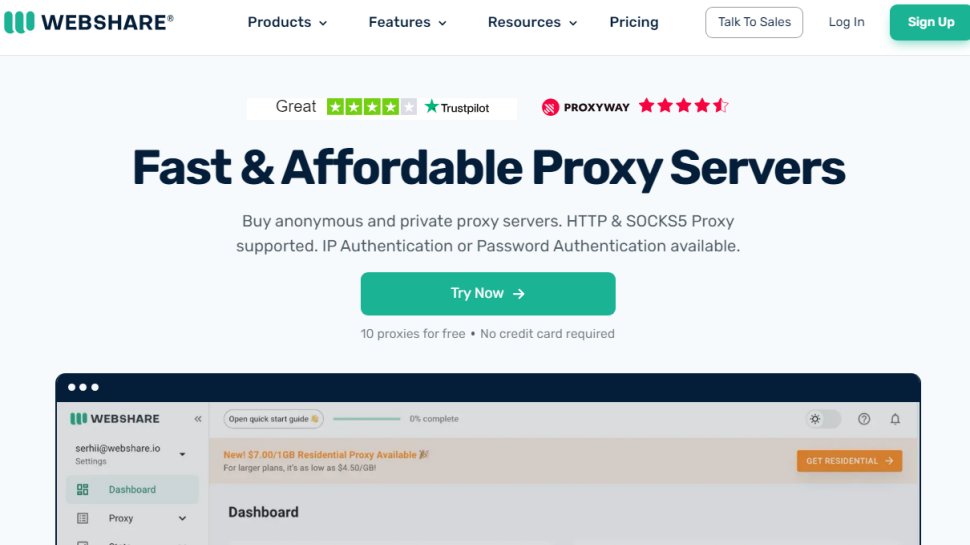
Specifications
Reasons to buy
Reasons to avoid
Webshare is a relative newcomer to the proxy scene, and as a result slightly lacks in its offering of IP addresses, and coverage, and the availability of other data scraping services and tools that you get with the more established players.
One of the best things about Webshare is its privacy first approach towards its clients. The service claims it never shares details about its users, or their proxy activity with any third-party. Also, unlike many of its peers, Webshare ensures that all of the proxy activity is encrypted, which adds another layer of security during data transmission, and prevents unauthorized access to sensitive information.
Webshare is a pure proxy service provider, and doesn’t offer other scraping solutions that you get with some of the larger players in the game. That said, just like some of the industry leaders, Webshare too offers support for both HTTP and SOCKS5 protocol proxies, the latter deemed more suitable for high performance, traffic-intensive tasks.
It’s currently offering its rotating residential IPs at a 50% discount, with plans starting $3.50/month. As is the norm in the proxy space, the larger your monthly bill, the smaller the per GB cost. So you are paying $2.75/GB in the 10GB plan that costs $27.50/month, while it only costs $1.40/GB in the 3,000GB plan that costs $4,200/month.
The pattern is repeated in the pricing of the static residential proxies, which are priced per IP. So you pay $0.3/proxy in the smallest plan that includes 20 proxies and costs $6/month. This drops down to $0.225/proxy in the largest pricing tier that bundles 10,000 proxies and costs $2,250/month.
Besides static and rotating residential proxies, Webshare also offers a Proxy Server product, which are nothing but datacenter proxies. These are the most affordable of the lot with prices starting $2.99/month for access to 100 proxies, all the way up to the 60,000 proxy package billed at $1,076.40/month.
And if you commit to yearly plans, you’ll save an additional 30%-50% on the price on all the three proxy offerings.
Now, while Webshare doesn’t offer a free trial with any of its plans, it does allow its users to use 10 free premium proxies. These offer up to 1GB of bandwidth every month, and you can use them forever since they don’t have a time cap. Remember however that since these are shared proxies, they might not be as performant as the paid pool of IPs.
Talking of downsides, the biggest drawback of Webshare remains its relatively small pool of IPs, and their restricted geographical diversity. We aren’t also big fans of its support facilities, which are primarily limited to written documentation.
Proxy Server | Static Residential | Rotating Residential |
|---|---|---|
$0.018 per proxy | $0.225 per proxy | $1.4 per GB |
Read our full Webshare Proxy Servers review.
Best proxy site at wholesale cost
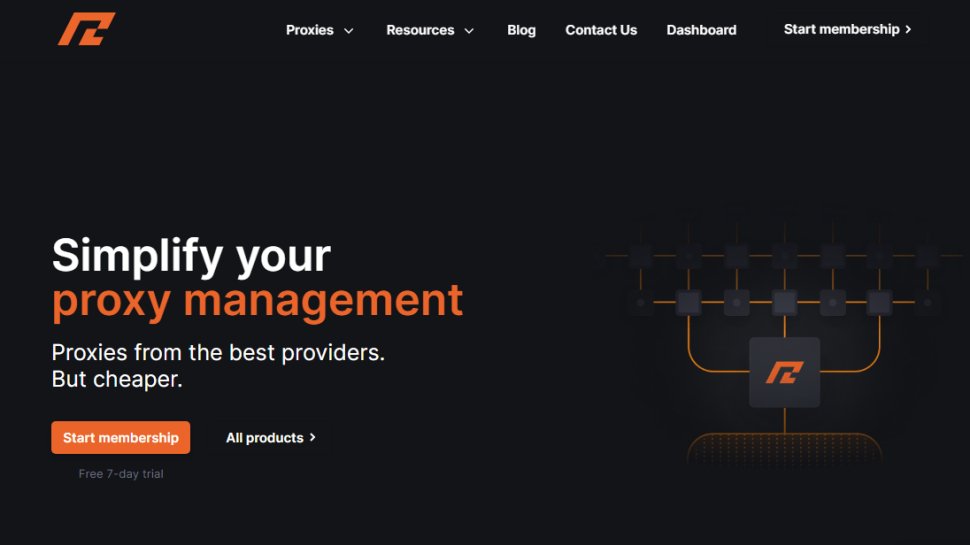
Specifications
Reasons to buy
Reasons to avoid
Rampage Proxies prides itself on its transparency by openly selling residential, datacenter, and ISP proxies from upstream providers on a no-commitment basis.
For residential proxies, Rampage Proxies offers plans from upstream providers such as Oxylabs, Decodo, IPRoyal, BrightData, and others, as well as proxies available direct from Rampage at highly competitive prices. For example, the Rampage Core package comes in at just $1/GB per month, and works best with low-security websites.
For better performance, especially across actively monitored websites, it offers the Rampage Residential package at $4.60/GB per month. Although it’s considerably more expensive than the Core package, it also offers city and state-level targeting. Then there’s the Rampage Mobile package that offers mobile IPs, again with both city and state-level targeting options at $7.80/GB.
Besides its own, Rampage also offers proxies from virtually every major provider at competitive rates. For instance, residential proxies from Oxylabs start at $3/GB, BrightData at $3.5/GB, IPRoyal at $2/GB, Smartproxy at $3/GB, and so on.
Where Rampage Proxies struggles slightly is in its provision of datacenter and ISP proxies. Datacenter proxies are only available in the UK, but with the benefit of being an inhouse product and unmetered.
Both the datacenter and ISP proxies are priced by the number of IPs. The UK-only datacenter proxies are priced at $1.35/IP per month. As for ISP proxies, these are available from ISPs in the UK (British Telecom), US, and Germany (Deutsche Telecom) at $1.7/IP per month.
The best thing about Rampage is that it lets you purchase and manage residential proxies from some of the largest names in the proxy space, all from the same dashboard. While Rampage’s own in-house proxies might be cheaper than some of the other services, it does lack some features such as support for SOCKS5 protocol.
Rampage Proxies also maintains a list of free proxies on its website that you can filter by country. At present it lists over 600 free IPs from the UK, US, Finland, Ireland, Germany, Japan, India, and several others. You can download the list of these free proxies in txt, json, or csv format. Remember that unlike Webshare, which offers 10 of its own premium proxies for free, the list of free proxies on Rampage are curated from the web so their performance can’t be guaranteed.
Finally, while there is no phone support, Rampage Proxies does offer a live chat option on its website.
Rampage Residential | Rampage Mobile | Rampage Core | Oxylabs | Decodo | Netnut | BrightData | IPRoyal | Packetstream |
|---|---|---|---|---|---|---|---|---|
$4.60 per GB | $7.8 per GB | $1.00 per GB | $3.00 per GB | $3.00 per GB | $5.50 per GB | $3.50 per GB | $2.00 per GB | $1.00 per GB |
Best proxy site for small-time users
Specifications
Reasons to buy
Reasons to avoid
Storm Proxies fills a niche in the market by offering an affordable option for simpler and smaller projects. While they may only have a limited pool of IPs to choose from and a fairly restricted geographic reach, Storm Proxies don't sell themselves as anything more than what they are - simple proxies at an affordable price.
Storm Proxies offer three proxy types - private dedicated datacenter, rotating backconnect, and rotating residential. While the first two primarily use IPs from datacenters, the last one uses purely residential IPs.
For the private datacenter proxies, pricing ranges from $10 for 5 IPs to $640 for 400 IPs, with many plans in between. As is the norm in the space, the price per IP drops as you commit to a larger plan, and if you commit for six months, they’ll only charge you for five.
The bonus about this is that you have access to unlimited bandwidth via the provider’s 1Gbps network across every single plan. All plans also let you run a maximum of 100 threads concurrently, and cover three locations within the US. So essentially, you just pick a plan based on the number of proxies you need.
The pricing for backconnect proxies is based on the number of simultaneous connections, and ranges from $39 per month for 40 concurrent connections, up to $97 per month for 150 connections.
With these plans you get the option to either change the IP with every HTTP request, or after three minutes, or 15 minutes. The three options are good enough for a majority of web scraping, content aggregation, price monitoring, account creations, without triggering anti-bot blocks.
Just like with its datacenter proxies, all backconnect proxies also offer unlimited bandwidth. All plans offer four location types. A US-only proxy, a EU-only proxy, a combined pool of US and EU proxies. There’s also a worldwide proxy option, though we aren’t sure which countries it offers, and how many of these are outside the US and EU, which has been a Storm Proxies mainstay.
Finally, for rotating residential proxies, the prices range from $50 per month for 5 IPs, up to $300 for 50 IPs. You can run a maximum of 50 concurrent threads on one IP. Once again, all plans come with unlimited bandwidth, so pick one that best matches your use case. All of these rotating residential proxy plans offer the same three IP rotation policies that you get with the backconnect proxies.
While it is one of the most affordable services, it also has one of the shortest pools of IPs, and a very limited coverage, as compared to many of its peers. Its lack of real-time support options takes away a bit of charm as well.
Overall, Storm Proxies is a simple, cost-effective, and easy-to-use solution perfect for users with smaller or less demanding projects.
Datacenter | Rotating backconnect | Rotating residential |
|---|---|---|
$1.6 per IP | $0.64 per connection | $6 per IP |
Read our full Storm Proxies review.
Best user-based proxy site
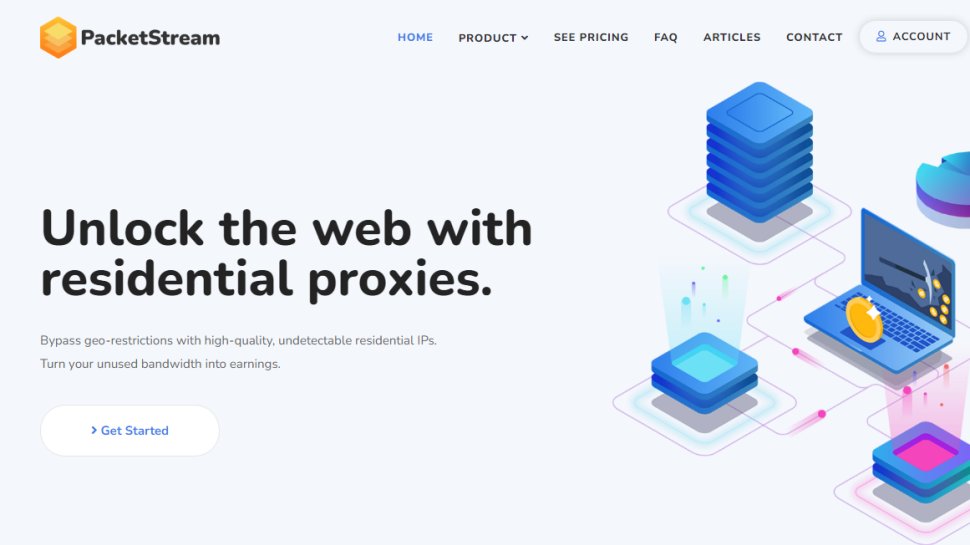
Specifications
Reasons to buy
Reasons to avoid
PacketStream's network differs significantly from others on this list. The network of residential IPs offered by PacketStream is built from real devices who's owners sell their extra internet bandwidth to be used by PacketStream as part of their network.
The best thing about PacketStream is its simple pricing structure. Unlike many proxy providers, PacketStream only sells residential proxies, and these are charged on a bandwidth basis at a flat fee of $1 per GB.
This gives you access to its entire residential proxy network. In addition to HTTP, PacketStream also supports the SOCKS proxy protocol, which is a definite plus. The platform also gives you the option to either use randomized IPs that change with every request, or static IP depending on your use case.
However, you’ll have to commit to a minimum of 50GB, which means you’ll have to pay at;east $50 to get started, and can then scale as per your needs. When compared to other providers on the per GB price, this is actually one of the most affordable options.
One standout feature for PacketStream is the ability for users to sell their excess internet bandwidth to PacketStream at $0.10 per GB with a minimum cashout amount of $5. So if your device is always on regardless and you have spare bandwidth, you have the option to generate a modest amount while contributing to a global network of proxies.
While it may be one of the most affordable residential proxy providers, our biggest gripe with PacketStream is that it doesn’t clearly state the total number of proxies in its pool. There’s also no mention of the countries it sources IPs from, though you do get the option to select a specific location from inside the platform.
Also, while the platform does offer a free trial, you’ll have to send in a request to their sales team for approval. Another area where PacketStream lags behind some of its peers is support, which is only dispensed via email, with no live chat or telephone options.
Earn (Become a packeter) | Buy Bandwidth |
|---|---|
$0.10 per GB | $1.00 per GB |
Read our full PacketStream review.
We've also featured the best URL filtering software.
Best proxy site FAQs
Julius Cerniauskas, CEO of Oxylabs
What is a proxy?
A proxy is an intermediary between the user and the web that adds an additional layer that connects to any website. Proxies have their own IP addresses, so the website the user is visiting will only see this proxy IP address.
In terms of origin, there are two types of proxies, data centre and residential:
A data center proxy is a private proxy that is not affiliated with an ISP because it comes from a secondary corporation and provides a private IP authentication, high-level anonymity and rapid data request response times. Usually, data center proxies are used for infrastructure, such as servers and web hosting.
A residential proxy is an intermediary using an IP address attached to a physical location provided by an Internet Service Provider (ISP) to a homeowner. It is a genuine IP address that can be used to imitate organic users behaviour.
You can read more about proxy servers here.
What are proxies used for?
As mentioned before, individuals and businesses widely use proxies. Let's explore the reasons behind it.
Personal use A proxy used for a personal case will be attached to a particular location. This can enable certain access to geo-blocked content. For example, consumers can browse and purchase flights from locations that offer the most advantageous prices.
Secondly, proxies can optimize user's web activity and improve security levels by encrypting requests.
Business use In most cases, businesses use proxies to gain advantage over competitors by gathering insightful information. The proxy gives them the ability to extract and process large amounts of publicly available data on competitor prices, products, services, reviews or even market trends that can accelerate businesses in their decision-making process regarding adapting marketing, sales and pricing strategies.
Such information would be impossible to extract without proxies in place due to recurring blocks. When data gathering is in progress, a large number of requests are made to a web server.
The difficulty arises when these requests come from the same IP address because websites identify this activity as suspicious and block the IP address for security reasons. Proxies prevent this as IP addresses can be constantly changed if rotating proxies or a proxy rotator is used. This way data gathering can continue to take place anonymously and efficiently.
In addition to data gathering, many businesses use proxies for email security as there are huge amounts of emails that contain malware attachments, ransomware or suspicious URLs. Proxies help to scan each inbound email and filter out malicious content.
Another common use case is brand protection, as proxies are employed to scan the web searching for stolen content or counterfeit goods.
What is the difference between paid proxies and free proxies?
With a free proxy you can access almost every proxy benefit, which is great until something goes wrong. Utilizing such services means that no one is responsible for technical faults, which happen to be a common occurrence in this case.
It is not easy to find a free, long-life proxy as they quickly become outdated and the providers usually turn into paid ones or disappear over time. Furthermore, using free proxies can pose a serious threat because you never know if your data is secure and you may run the risk of falling victim identity theft.
Paid proxies are responsible for their services, with contracts and agreements in place to protect the user. For businesses, there is no other option but to pay for a dedicated proxy service and avoid any potential security issues. If you choose a reliable proxy provider, you should not need to worry about servers crashing or disappearing for no reason as many will offer dedicated account support.
A reliable proxy provider will also have ethically sourced proxies. Deciding what proxy provider to choose is not an easy task as there are many criteria to consider, but we have singled out a few key points:
Reliability: 24/7 customer support and account managers, service trials and a money-back guarantee are must-haves for a reliable proxy provider. Pay attention to client reviews as well
IP pool size and location: IP pool size and location variety are critical for those who will be scraping large amounts of data from various countries
Success rates and speed: a reliable proxy network success rate should be at least 90%, with the best providers guaranteeing 95% or higher
Integration and support: proxy providers must ensure their documentation is clear and understandable, including integration tutorials and clear instructions
Is using proxies legal?
Utilizing a proxy server is not inherently illegal, but its legality can vary based on the usage and the jurisdiction. In certain regions, employing a proxy to circumvent internet censorship or to visit sites with access restrictions might be against the law.
What’s the difference between a VPN and a proxy?
A VPN and a proxy both mask your IP address by routing your internet through a remote server. However, a proxy is limited to specific apps or services, while a VPN covers all internet traffic and encrypts it for enhanced security and privacy. Unlike proxies, VPNs also secure your online activities with an encrypted tunnel. For basic browsing, a proxy may suffice, but for full security, a VPN is preferable.
You can read more about the differences between a VPN and a proxy here.
Does proxy hide your IP address?
While proxies don't provide complete anonymity, they do typically hide your IP address. When you connect to the internet through a proxy, it displays the proxy server's IP address instead of your own. This prevents websites from seeing your real location, enhancing your privacy.
The future of proxies
Businesses mostly use proxies for large-scale data gathering and extraction, but this is not an easy process. It consists of many complex tasks, especially when anti-data gathering measures are becoming more sophisticated and making it harder to collect publicly available information without being blocked. To address this, Artificial Intelligence (AI) and Machine Learning (ML) innovations are gradually being applied.
Ultimately, proxies are extremely valuable solutions for both individuals and businesses that need to make accurate data-driven decisions. For individuals, proxies can help to access geo-blocked content, improve security levels, and optimize a web activity. For businesses, not only will they provide an extra layer of security, but they are quickly becoming an indispensable tool to gather publicly available information.
Things to consider when choosing a proxy provider
Geo-Targeting: Geo-targeting enables users to access content or bypass restrictions based on geographic location. Choosing a proxy provider with a wide range of IP addresses is crucial for accessing location-specific data.
Speed: Speed and latency are critical in proxies. High-speed proxies ensure quick data transfers, essential for extensive web scraping, while low latency is crucial for tasks requiring timely data, such as live streaming. Opt for a provider that offers both.
Number of IPs: The number of IP addresses a proxy provider offers is vital when frequently changing IPs for anonymity and to avoid anti-scraping measures. Ensure the provider's IP pool is large and diverse, including residential and datacenter options.
Cost: Cost is a significant consideration when selecting a proxy service. Assess the type of proxies, pricing plans, and any extra features to determine the best value for your needs. Consider pay-as-you-go plans for flexibility or fixed plans for consistent high-volume use.
How to choose the best proxy?
When selecting the best proxy for yourself, choose tools that have features useful to you, like geo-restriction bypassing, browser extensions, unlimited bandwidth, and a large proxy pool.
If speed is a priority, check for the server speeds and locations, and if security is a priority, look at the service's encryption level. Lastly, assess whether the proxy's pricing models are suitable for your needs.
How we tested the best proxy server
In our testing, we always dabble with various settings and options. We check the speed, security, encryption, server options, the number of proxy IPs, and if there's support for the SOCKS5 protocol.
We also check if a proxy can successfully pass through the blocks and captchas, and if it has a web scraping tool to fetch data for its users. Pricing is another part we take a close look at as not everyone can afford the more pricey solutions. Plus, if it’s expensive, it doesn’t necessarily automatically mean it’s a great service.
Lastly, we look for any extra settings or features. This can be anything from their own browsers to a simple ad-blocking solution.
Read how we test, rate, and review products on TechRadar.
Get in touch
- Want to find out about commercial or marketing opportunities? Click here
- Out of date info, errors, complaints or broken links? Give us a nudge
- Got a suggestion for a product or service provider? Message us directly
- You've reached the end of the page. Jump back up to the top ^
Sign up to the TechRadar Pro newsletter to get all the top news, opinion, features and guidance your business needs to succeed!

Benedict has been with TechRadar Pro for over two years, and has specialized in writing about cybersecurity, threat intelligence, and B2B security solutions. His coverage explores the critical areas of national security, including state-sponsored threat actors, APT groups, critical infrastructure, and social engineering.
Benedict holds an MA (Distinction) in Security, Intelligence, and Diplomacy from the Centre for Security and Intelligence Studies at the University of Buckingham, providing him with a strong academic foundation for his reporting on geopolitics, threat intelligence, and cyber-warfare.
Prior to his postgraduate studies, Benedict earned a BA in Politics with Journalism, providing him with the skills to translate complex political and security issues into comprehensible copy.

